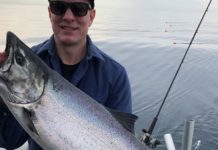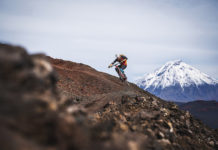August is Water Quality Month. Got clean water? Then thank an angler or boater. Anglers and boaters, along with recreational shooters and hunters, pay billions in excise taxes and license fees. These fees then go to states to conserve fish and wildlife, and enhance recreational opportunities through restored and conserved habitats, all of which protect our land, air and water.
August 2020 is the 70th anniversary of the Dingell-Johnson Act, officially known as the Federal Aid in Sport Fish Restoration Act, spearheaded by outdoor enthusiasts, Congressman John Dingell of Michigan and Sen. Edwin Johnson of Colorado. The act created a “user pays, user benefits” program modeled after the successful Pittman-Robertson Act of 1937, or the Federal Aid in Wildlife Restoration Act. With Dingell-Johnson, a 10% excise tax is collected on the sale of fishing rods and poles, hooks/lines/sinkers, artificial lures, and other fishing supplies, accessories, and equipment. In addition, a 3% tax is imposed on the sale price of electric outboard boat motors along with a tax on motorboat fuel and small engine fuel.
To be eligible for these grants, a state must have laws that include a prohibition against diverting fishing license fees for any other purpose than the administration of the state’s fish and wildlife agency. For Ohio, that would be the Division of Wildlife under the Ohio Department of Natural Resources. Each state must provide a 25% match, and in most cases, the match comes from fishing license revenues. The funds must be used for on-the-ground conservation needs such as fish and wildlife management, species and habitat restoration, habitat protection, land acquisition, scientific study, population monitoring, aquatic education, and access for fishing and boating, just to name a few examples. While the Dingell-Johnson act is considered a “user pays, user benefits” program, in reality, everyone benefits from increased stewardship of our natural resources, including clean water.
You too can be part of improving water quality. Learn to fish! Ohio is rich in water resources with more than 60,000 miles of streams, the Ohio River, Lake Erie, many public lakes, and private ponds. Why not join the 35.8 million anglers (according to the U.S. Fish and Wildlife Service, 2016) enjoying one of the oldest and most popular outdoor activities? Fishing can be as simple and inexpensive as a cane pole and a worm, or as intricate as the art of fly fishing. Here are some outstanding resources to get you started:
• Ohio Division of Wildlife at wildlife.ohio.gov is the place to learn about fishing regulations and buy your fishing license. It also has an extensive list of topics for beginners, including fishing tips by species, the basics of fishing equipment, lakes and reservoir fishing maps, the free download of the “Sport Fish of Ohio Field Guide,” and more.
• Take Me Fishing at takemefishing.org is a comprehensive website on how and where to fish and boat by the Recreational Boating and Fishing Foundation. The website covers everything you need, “whether you are in search of your first catch or your biggest trophy fish to date.” It is easy to use and includes an interactive map on locations for fishing and boating across the U.S.
• The U.S. Fish and Wildlife Service’s website has environmental education resources for teachers, parents, and kids at fws.gov/fisheries/environmental_education.html. Discover the fishing opportunities at national wildlife refuges, national fish hatcheries, and many other USFWS lands and waters.
If you are lucky enough to have your own pond or are interested in building one, the Delaware Soil and Water Conservation District’s website has several publications you may download to guide you in the planning, care, and maintenance of owning a pond. You can also check out our annual fish sale which is going on now.
2020 has been an unusual year. Fishing can provide a welcome respite to COVID-19 stress, enhancing your family’s health and wellness. Buying a fishing license, grabbing a pole, and casting for the big one is an ideal way to get out of the house and feel the magic. You can pass some pleasant hours and support the conservation of Ohio’s natural resources. Watch out though, you might just “get hooked!”
Bonnie Dailey is deputy director of the Delaware Soil & Water Conservation District. For information, go to https://soilandwater.co.delaware.oh.us/.
Credit: Source link































